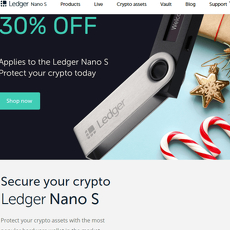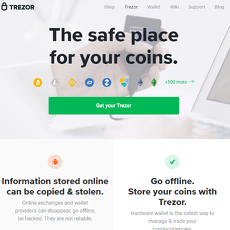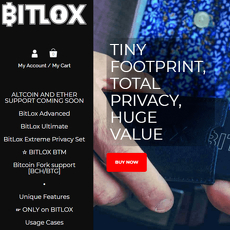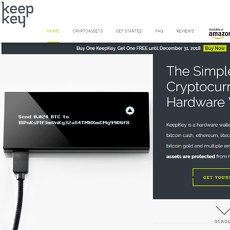Best Hardware Wallets (2026) – Ledger, Trezor & More
The world is increasingly leaning towards digital products, which bodes well for the burgeoning crypto technology. It is becoming obvious that the future economy will thrive on a new breed of currencies that allow average individuals to circumvent central authorities. This assertion has become more potent now that enterprises are looking to capitalize on the crypto craze. However, it is common knowledge that security has marred the viability of crypto technology, and the capacity of developers to put an end to incessant security breaches would determine whether crypto reaches its potential.
Fortunately, we have begun to see crypto experts make the right move, even as wallet providers continue to experiment and introduce new and more secure ways to store digital assets. As expected, such innovative drive has propelled the emergence of hardware wallets as the most secure model for keeping crypto assets safe. Owing to these developments, we have thought it right to review the hardware wallet markets and introduce you to our list of or the service providers vying for the top spot in this crypto sector. Before that, we will explore the concept of a hardware wallet and the factors you should look out for when choosing one.
It is easier to understand the concept of hardware wallets when you unravel the complexities of a crypto wallet. Hence, prior to defining what a hardware wallet is, we will first discuss the workings of a wallet. Trust that no one will blame you for thinking that crypto wallets function the same way as traditional wallets. Although a crypto wallet does have the same core functionalities as its traditional counterpart, which is to keep your funds safe and accessible, however, the way it goes about doing this is different. Remember that crypto wallets are tailored to keep digital assets safe. Therefore, they have to incorporate new ways to cope with the non-physical nature of cryptocurrency.
In essence, crypto wallets do not store the digital assets per se. Instead, they hold the private keys that give people access to their crypto holdings. And so, the primary function of crypto wallets is to hide private keys away from nefarious entities. Yet, there are different ways to go about this. Some wallet providers would offer custodial solutions, which entails that their users trust them with their private keys. This class of wallets is commonly called hot or software wallets. On the other hand, some only provide devices to store keys, which promotes autonomy. This second set of entities are hardware or cold storage wallet providers.
We have touched on the fundamentals of hardware wallets in the previous section. In its basic form, hardware wallets are like USB sticks, which come with software and security chips that make them a tad difficult to hack. Remarkably, your private keys never leave these devices when you connect them to a computer to execute transactions. Thus, hardware wallets are fortresses for digital assets. It would do you a lot of good to adopt one, especially if you are skeptical about the whole third-party wallet services.
Hardware wallets can support more than one cryptocurrency. They allow users to set 4 to 8 digits pins, which serve as passwords deterring unauthorized access. In most cases, wallet providers avail another layer of identity verification security framework – 2FA authentication – that further assures users that it is almost impossible to hack these devices. The only security threat that is associated with hardware wallets is physical theft. Even at that, stealing a hardware wallet is of no use, since the owner can simply recover the contents of the wallet in a straightforward process.
The first thing you do, as a new owner of a hardware wallet, is to set your pin. This you can do by connecting the device to your computer and following the prompts on the wallets provider’s software or website. Ensure that you set a pin that is not too hard to forget, and do not disclose it untrusted parties, as it gives direct access to the digital assets linked to the private keys stored on the wallet.
Furthermore, hardware wallet providers have implemented various security measures to prevent unauthorized access. For one, some wallets format their contents as soon as you enter the wrong pin consecutively. Others enable waiting time when you enter the wrong pin several times in a row. The waiting time multiplies by a factor until it reaches a threshold, which triggers the hardware wallet to wipe itself clean.
Also, the wallet provider assigns you a recovery phase that comes in handy whenever you are on the verge of reactivating and accessing wiped contents or lost wallets. We advise that you write this phrase on a piece of paper, instead of storing it on internet-connected devices. By so doing, you can ascertain that hackers or prying eyes have no way of accessing this sensitive information. However, ensure that you do not lose your recovery phrase, as it is the only way you can claim a lost wallet. Interestingly, you can recover accounts through any software or hardware wallets that support the same security standards present on your original wallet.
More impressively, you can infuse an element of 2FA authentication to your recovery process. To do this, you can activate the passphrase functionality, which adds one more password to the recovery phrase just to verify that it is you that authorized the recovery process. We advise that you keep both your passphrase and recovery phrase safe. And preferably, store them separately.
Another important fact about hardware wallets is that you can create a decoy wallet, which is a safety measure useful in situations where you are physically forced to give up information about your hardware wallet. Here, all you need to do is enter your recovering phrase and any password, apart from your passphrase, to open a decoy wallet. You can transfer a small amount of crypto to this wallet to throw attackers off the scent of your plot. Once you have all these security mechanisms set up, you can start receiving and sending cryptocurrency.
Now that you understand the workings of a hardware wallet, and might be looking to adopt one, it is crucial to consider several factors before going all out to buy one.
Cryptocurrency hardware wallets are usually flexible devices, which supports a broad array of cryptocurrencies. While this assertion is somewhat the norm, it is your responsibility to ascertain that the hardware wallet you are considering has the infrastructure that supports a long list of cryptocurrencies. In particular, you should check to see that your favorite cryptos are among the list of supported coins. Also, note the number of cryptocurrencies that you can store on the wallet at a time. All this information would help you streamline your search.
Recall that we had extensively analyzed the security mechanisms of hardware wallets. Ensure that your device complies with these standards – that is enabling security pin and a recovery phrase process with two-factor authentication. To dive deeper, you could analyze the wallet’s security and encryption protocol and compare them with market standards.
Reputation is everything in the crypto wallet market. Therefore, hardware wallet providers are invested in ensuring that their brands remain on the good books of crypto participants. Hence, you should take the time to research wallet providers’ track records, as regards the innovative edge they bring into creating cold storage devices. In some cases, it is advisable to stick with tested and trusted brands like Trezor hardware wallet. On the other hand, a new player might have all of the features that could lure you to take a leap of faith. Whichever you choose, you ought to ensure that the wallet provider has proven beyond doubt that it is running a legitimate business model that takes users’ security seriously.
Regardless of how simple they look, crypto hardware wallets contain some sophisticated technologies and processes that could prove too difficult for some users. And so, whenever you encounter a snag, you would want your wallet provider to work hand-in-hand with you to find a solution. That said, you will agree that accessing quick responses and solutions depends on the quality of the customer support system available on the hardware wallet’s website. Ideally, a wallet provider should avail 24/7 customer support. Also, there is a need to offer these services in different languages and on different channels. You could ascertain the ability of a wallet provider to implement these services by assessing its activities on social media networks and the number of communication channels available on its website.
Unlike hot wallets, it is costly to store your private keys in a cold storage device. Note that there are lots of hardware wallets in the market, and the price of each depends on the brand that produced it and the number of features and cryptocurrencies it supports. Hence, when opting for one, we advise that you consider your cost as well as the features you would want to have on your hardware wallet. In other words, take a look at the functionalities of the device, how safe it is, and if buying it at the stated price is a bargain.
Hardware wallet companies have continued to tweak the technology by infusing new features that ensure that the device does its job to the letter. Hence, it is no surprise that some of these wallets, like the Ledger wallet, the have connectivity protocols that allow them to connect with mobile devices effortlessly. With this, you do not need to connect to a computer before carrying out basic functions like transactions. Instead, you can simply use your smartphone to do this. Besides, hardware wallets are beginning to come with screens to help users track their holdings without connecting it to the internet.
Moreover, you should ensure that your hardware wallet is compatible with your computer or mobile phone’s operating system. Try as much as possible to avoid wallets that are selective, so that you don’t get stranded peradventure your system is not available or you can’t find one with a similar operating system as yours.
Having explored some of the factors that you should consider when choosing a hardware wallet, the next section will introduce you to our list of the best hardware wallets available in the market today and how we came about this list.
We at Cryptolinks know that there are a lot of variables to consider when researching the best hardware wallet for you. Hence, we have done the hard work of presenting you with all of the information that will help you make the right choice. Part of the responsibility we have taken up is listing the top performing hardware wallets and showcasing their weaknesses and strengths.
To go about this task, we analyzed the number of digital assets the wallet can support at a time. Then, we took a look at the security mechanisms of each. It is clear that security is the core functionality of these devices, and it is only fair that providers give their all into ensuring that their system is unbreachable.
Thereafter, we assessed the customer support systems of each, and we verified that there are infrastructures in place to help users communicate their complaints efficiently. Also, reputation came to play in our review, and we determined whether the providers had done enough to establish themselves as valid brands in the hardware wallet market. Lastly, we explored the extra features found on each wallet and how they improve the lives of users.
At the end of this review process, we found 5 hardware wallets that scored considerably high across all boards. As always, we advise that you take the time to check the review on each hardware wallet on our list to get all of the facts straight before making up your mind.
Fortunately, we have begun to see crypto experts make the right move, even as wallet providers continue to experiment and introduce new and more secure ways to store digital assets. As expected, such innovative drive has propelled the emergence of hardware wallets as the most secure model for keeping crypto assets safe. Owing to these developments, we have thought it right to review the hardware wallet markets and introduce you to our list of or the service providers vying for the top spot in this crypto sector. Before that, we will explore the concept of a hardware wallet and the factors you should look out for when choosing one.
What Is A Wallet?
It is easier to understand the concept of hardware wallets when you unravel the complexities of a crypto wallet. Hence, prior to defining what a hardware wallet is, we will first discuss the workings of a wallet. Trust that no one will blame you for thinking that crypto wallets function the same way as traditional wallets. Although a crypto wallet does have the same core functionalities as its traditional counterpart, which is to keep your funds safe and accessible, however, the way it goes about doing this is different. Remember that crypto wallets are tailored to keep digital assets safe. Therefore, they have to incorporate new ways to cope with the non-physical nature of cryptocurrency.
In essence, crypto wallets do not store the digital assets per se. Instead, they hold the private keys that give people access to their crypto holdings. And so, the primary function of crypto wallets is to hide private keys away from nefarious entities. Yet, there are different ways to go about this. Some wallet providers would offer custodial solutions, which entails that their users trust them with their private keys. This class of wallets is commonly called hot or software wallets. On the other hand, some only provide devices to store keys, which promotes autonomy. This second set of entities are hardware or cold storage wallet providers.
What Are Hardware Wallets?
We have touched on the fundamentals of hardware wallets in the previous section. In its basic form, hardware wallets are like USB sticks, which come with software and security chips that make them a tad difficult to hack. Remarkably, your private keys never leave these devices when you connect them to a computer to execute transactions. Thus, hardware wallets are fortresses for digital assets. It would do you a lot of good to adopt one, especially if you are skeptical about the whole third-party wallet services.
How Do Hardware Wallets Work?
Hardware wallets can support more than one cryptocurrency. They allow users to set 4 to 8 digits pins, which serve as passwords deterring unauthorized access. In most cases, wallet providers avail another layer of identity verification security framework – 2FA authentication – that further assures users that it is almost impossible to hack these devices. The only security threat that is associated with hardware wallets is physical theft. Even at that, stealing a hardware wallet is of no use, since the owner can simply recover the contents of the wallet in a straightforward process.
The first thing you do, as a new owner of a hardware wallet, is to set your pin. This you can do by connecting the device to your computer and following the prompts on the wallets provider’s software or website. Ensure that you set a pin that is not too hard to forget, and do not disclose it untrusted parties, as it gives direct access to the digital assets linked to the private keys stored on the wallet.
Furthermore, hardware wallet providers have implemented various security measures to prevent unauthorized access. For one, some wallets format their contents as soon as you enter the wrong pin consecutively. Others enable waiting time when you enter the wrong pin several times in a row. The waiting time multiplies by a factor until it reaches a threshold, which triggers the hardware wallet to wipe itself clean.
Also, the wallet provider assigns you a recovery phase that comes in handy whenever you are on the verge of reactivating and accessing wiped contents or lost wallets. We advise that you write this phrase on a piece of paper, instead of storing it on internet-connected devices. By so doing, you can ascertain that hackers or prying eyes have no way of accessing this sensitive information. However, ensure that you do not lose your recovery phrase, as it is the only way you can claim a lost wallet. Interestingly, you can recover accounts through any software or hardware wallets that support the same security standards present on your original wallet.
More impressively, you can infuse an element of 2FA authentication to your recovery process. To do this, you can activate the passphrase functionality, which adds one more password to the recovery phrase just to verify that it is you that authorized the recovery process. We advise that you keep both your passphrase and recovery phrase safe. And preferably, store them separately.
Another important fact about hardware wallets is that you can create a decoy wallet, which is a safety measure useful in situations where you are physically forced to give up information about your hardware wallet. Here, all you need to do is enter your recovering phrase and any password, apart from your passphrase, to open a decoy wallet. You can transfer a small amount of crypto to this wallet to throw attackers off the scent of your plot. Once you have all these security mechanisms set up, you can start receiving and sending cryptocurrency.
What Are the Things to Look Out for When Choosing A Cryptocurrency Hardware Wallet? ?
Now that you understand the workings of a hardware wallet, and might be looking to adopt one, it is crucial to consider several factors before going all out to buy one.
The Number of Cryptocurrencies the Hardware Wallet Supports
Cryptocurrency hardware wallets are usually flexible devices, which supports a broad array of cryptocurrencies. While this assertion is somewhat the norm, it is your responsibility to ascertain that the hardware wallet you are considering has the infrastructure that supports a long list of cryptocurrencies. In particular, you should check to see that your favorite cryptos are among the list of supported coins. Also, note the number of cryptocurrencies that you can store on the wallet at a time. All this information would help you streamline your search.
The Security Mechanism Available on The Hardware Wallet
Recall that we had extensively analyzed the security mechanisms of hardware wallets. Ensure that your device complies with these standards – that is enabling security pin and a recovery phrase process with two-factor authentication. To dive deeper, you could analyze the wallet’s security and encryption protocol and compare them with market standards.
The Reputation of The Hardware Wallet
Reputation is everything in the crypto wallet market. Therefore, hardware wallet providers are invested in ensuring that their brands remain on the good books of crypto participants. Hence, you should take the time to research wallet providers’ track records, as regards the innovative edge they bring into creating cold storage devices. In some cases, it is advisable to stick with tested and trusted brands like Trezor hardware wallet. On the other hand, a new player might have all of the features that could lure you to take a leap of faith. Whichever you choose, you ought to ensure that the wallet provider has proven beyond doubt that it is running a legitimate business model that takes users’ security seriously.
The Customer Support of The Hardware Wallet’s Provider
Regardless of how simple they look, crypto hardware wallets contain some sophisticated technologies and processes that could prove too difficult for some users. And so, whenever you encounter a snag, you would want your wallet provider to work hand-in-hand with you to find a solution. That said, you will agree that accessing quick responses and solutions depends on the quality of the customer support system available on the hardware wallet’s website. Ideally, a wallet provider should avail 24/7 customer support. Also, there is a need to offer these services in different languages and on different channels. You could ascertain the ability of a wallet provider to implement these services by assessing its activities on social media networks and the number of communication channels available on its website.
What It Costs to Acquire the Hardware Wallets
Unlike hot wallets, it is costly to store your private keys in a cold storage device. Note that there are lots of hardware wallets in the market, and the price of each depends on the brand that produced it and the number of features and cryptocurrencies it supports. Hence, when opting for one, we advise that you consider your cost as well as the features you would want to have on your hardware wallet. In other words, take a look at the functionalities of the device, how safe it is, and if buying it at the stated price is a bargain.
The Features of The Hardware Wallet
Hardware wallet companies have continued to tweak the technology by infusing new features that ensure that the device does its job to the letter. Hence, it is no surprise that some of these wallets, like the Ledger wallet, the have connectivity protocols that allow them to connect with mobile devices effortlessly. With this, you do not need to connect to a computer before carrying out basic functions like transactions. Instead, you can simply use your smartphone to do this. Besides, hardware wallets are beginning to come with screens to help users track their holdings without connecting it to the internet.
The Number of OS That the Wallet Is Compatible With
Moreover, you should ensure that your hardware wallet is compatible with your computer or mobile phone’s operating system. Try as much as possible to avoid wallets that are selective, so that you don’t get stranded peradventure your system is not available or you can’t find one with a similar operating system as yours.
Having explored some of the factors that you should consider when choosing a hardware wallet, the next section will introduce you to our list of the best hardware wallets available in the market today and how we came about this list.
How Did Cryptolinks Compile Its List of Top Hardware Wallets?
We at Cryptolinks know that there are a lot of variables to consider when researching the best hardware wallet for you. Hence, we have done the hard work of presenting you with all of the information that will help you make the right choice. Part of the responsibility we have taken up is listing the top performing hardware wallets and showcasing their weaknesses and strengths.
To go about this task, we analyzed the number of digital assets the wallet can support at a time. Then, we took a look at the security mechanisms of each. It is clear that security is the core functionality of these devices, and it is only fair that providers give their all into ensuring that their system is unbreachable.
Thereafter, we assessed the customer support systems of each, and we verified that there are infrastructures in place to help users communicate their complaints efficiently. Also, reputation came to play in our review, and we determined whether the providers had done enough to establish themselves as valid brands in the hardware wallet market. Lastly, we explored the extra features found on each wallet and how they improve the lives of users.
At the end of this review process, we found 5 hardware wallets that scored considerably high across all boards. As always, we advise that you take the time to check the review on each hardware wallet on our list to get all of the facts straight before making up your mind.







